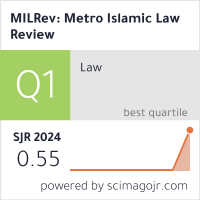Reinforcing the Role of the Gakkumdu Center in Electoral Law Enforcement: A Contemporary Analysis from the Perspective of Fiqh Siyasah Dusturiyah
DOI:
https://doi.org/10.32332/milrev.v4i2.11108Keywords:
Electoral Law Enforcement, Fiqh Siyasah Dusturiyah, Gakkumdu Center, Strengthening.Abstract
The Integrated Law Enforcement Center (Sentra Gakkumdu) plays a vital role in ensuring the integrity of General and Regional Elections. However, its effectiveness has always been debated. Data from Lampung Province show an extremely low prosecution rate, indicating entrenched issues in its structure, legal framework, and institutional culture. This study aims to analyze the central causes of Gakkumdu’s ineffectiveness in Lampung and to formulate a concrete, integrated institutional-strengthening model from the perspective of Fiqh Siyasah Dusturiyah. This research employs an integrated socio-legal approach, combining normative legal analysis of legislation with qualitative empirical methods and in-depth interviews conducted through purposive sampling. To maintain methodological consistency, the empirical findings were critically analyzed using Lawrence Friedman’s Legal System Theory (Structure, Substance, Culture). The findings reveal that Gakkumdu’s ineffectiveness stems primarily from: 1) conflicting SOPs regarding evidentiary standards (legal substance); 2) inter-agency ego (legal culture); and 3) the ad hoc status of its personnel (legal structure). Consequently, the proposed strengthening model emphasizes harmonizing technical operational regulations, cultivating a collaborative culture, and evaluating performance based on quantitative metrics to boost the case completion rate. From the perspective of Fiqh Siyasah Dusturiyah, this reinforcement aligns with the core principles of al-mashlahah al-‘ammah (public good) and ‘adl (justice) as the philosophical foundation for political legitimacy. This study concludes that an integrated Gakkumdu strengthening model, informed by FSD, is essential to ensure a transparent electoral process and bolster public trust. It offers a conceptual contribution by bridging empirical legal analysis (Friedman) with Islamic ethical jurisprudence (FSD) in the context of Indonesian election law enforcement.
Downloads
References
Annizar, Ahmad, Zainul Fuad, and M Syukri Albani Nasution. “Identity Politics and Prospective Leader Selection: A Perspective from Fiqh Siyasah.” Jurnal Ilmiah Mizani: Wacana Hukum, Ekonomi Dan Keagamaan 11, no. 1 (2024): 150–170. https://doi.org/10.29300/mzn.v11i1.3445.
Ashar, Ashari, Lomba Sultan Sultan, Abdul Rahim, and Abd Rahman. “The Factors Causing The Emerging of Transactional Politics in The Local Election in East Kalimantan 2005 From The Perspective of Siyasah Syar’iyyah.” Al-’Adalah 17, no. 1 (2020): 97–110. https://doi.org/10.24042/adalah.v17i1.6633.
Candra, Afrikal, Faisal Efendi, Ikhwanuddin Abdul Majid, and Nurlaila Nurlaila. “Fiqh Siyasah Review of Social Welfare in Padang City: How Is It Implemented.” Bilancia: Jurnal Studi Ilmu Syariah Dan Hukum 18, no. 2 (2024): 195–218. https://doi.org/10.24239/blc.v18i2.3323.
Caniago, Sulastri, Zainal Azwar, Dian Pertiwi, and Dasrizal Marah Nainin. “Gender Integration in Islamic Politics: Fiqh Siyasah on Women’s Political Rights since Classical to Contemporary Interpretations.” MILRev: Metro Islamic Law Review 3, no. 2 (2024): 411–431. https://doi.org/10.32332/milrev.v3i2.9962.
Darmawati, Darmawati, Mulyadi Alrianto Tajuddin, and Firman Hadi. “Law Enforcement Problems in Handling 2019 General Election Crimes by Gakkumdu.” SASI 28, no. 3 (2022): 482–491. https://doi.org/10.47268/sasi.v28i3.1030.
Elklit, Jørgen, and Andrew Reynolds. “A Framework for the Systematic Study of Election Quality.” Democratization 12, no. 2 (April 2005): 147–162. https://doi.org/10.1080/13510340500069204.
Febriansyah, Muhammad, Muhamad Takiyuddin Ismail, and Norazam Mohd Noor. “Competing Not Complementing: KPU, Bawaslu, and the Dynamic of Election Monitoring in PEMILU 2019.” Asian Journal of Political Science 28, no. 3 (2020): 275–293. https://doi.org/10.1080/02185377.2020.1781670.
Hariyanto, Hariyanto, Muhammad Mutawalli Mukhlis, and Daud Rismana. “The Role and Authority of the Deputy Regional Head According to Islamic Principles within the Framework of Regional Government Law.” JURIS (Jurnal Ilmiah Syariah) 24, no. 1 (2025): 13–27. https://doi.org/http://dx.doi.org/10.31958/juris.v24i1.12678.
Jamshed, Shazia. “Qualitative Research Method-Interviewing and Observation.” Journal of Basic and Clinical Pharmacy 5, no. 4 (2014): 87. https://doi.org/10.4103/0976-0105.141942.
Karim, Zahlul Pasha, Khairil Akbar, and Ihdi Karim Makinara. “Kontestasi Dewan Perwakilan Rakyat Dan Mahkamah Konstitusi Dalam Menyelesaikan Polemik Lembaga Penyelenggara Pemilu Di Aceh.” De Jure: Jurnal Hukum Dan Syar’iah 13, no. 2 (2021): 283–309. https://doi.org/10.18860/j-fsh.v13i2.13876.
Lestari, Dina. “The Concept of Maslahah in Structuring Election Regulations: A Maqasid Syariah Approach.” Maslahah: Jurnal Hukum Islam Dan Perbankan Syariah 2 (2025): 101–120.
Lubis, Ali Akhbar Abaib Mas Rabbani. “Open Promotion of the Regional Secretary of Sambas Regency: Perspectives on Slyasah Jurisprudence and Legislation in Indonesia.” J. Islamic L. 1 (2020): 158.
Lumbantoruan, Inrayanti, and Budiman Sinaga. “Penegakan Aturan Pemilu Oleh Bawaslu Melalui Implementasi Mekanisme Pelanggaran Dan Penindakan Berdasarkan Ketentuan Yang Berlaku.” Jurnal Prisma Hukum 9, no. 1 (2025).
Maryani, Desy, Arie Elvis Rahael, Ahmad Rahawarin, Ariyanto, Muslim, Farida Tuharea, Zonita Zirhani Rumalean, and Wahyudi Br. ‘A Model of Implementing Restorative Justice Perspective of Trong Yowari Traditional Jurisdiction, Jayapura Regency’. NUSANTARA: Journal Of Law Studies 2, no. 1 (March 2023): 1.
Matahari, Iklima, Beni Ahmad Saebani, and Yana Sutiana. “Penegakan Hukum Terhadap Pelanggaran Pemilihan Umum Kepala Daerah (Pemilukada) Oleh Badan Pengawas Pemilu (Bawaslu) Di Kabupaten Bandung Dalam Perspektif Siyasah Dusturiyah.” Ranah Research: Journal of Multidisciplinary Research and Development 7, no. 4 (2025): 3091–3105. https://doi.org/10.38035/rrj.v7i4.1658.
Medvic, Stephen K. Campaigns and Elections: Players and Processes. Routledge, 2021.
Mukhlis, Muhammad Mutawalli, Maskun Maskun, Muhammad Saleh Tajuddin, Jamal Aslan, Hariyanto Hariyanto, and Hotlan Samosir. “Regional Autonomy System: Delegation of Authority and Power of Regional Government in Indonesia in the Study of Fiqh Siyasah.” Al-Istinbath: Jurnal Hukum Islam 9, no. 2 (2024): 505–526.
Musakkir; Riza Andi Pangerang; Akub, M. Syukri, Marwati; Moenta. “The Essence of Law Enforcement on Election Violations in Indonesia.” JL Pol’y & Globalization 122 (2022): 31. https://doi.org/10.7176/JLPG/122-04.
Onwuegbuzie, Anthony J, and Rebecca K Weinbaum. “Mapping Miles and Huberman’s Within-Case and Cross-Case Analysis Methods onto the Literature Review Process.” Journal of Educational Issues 2, no. 1 (2016): 265–288. https://doi.org/10.5296/jei.v2i1.9217.
Parman, Lalu. “Unlawful Crime Management of Election.” J. Legal Ethical & Regul. Isses 24 (2021): 1.
Prasetyo, Agung. “Electoral Bribery as Violation of Amanah in Fiqh Siyasah.” Ijtihad: Jurnal Wacana Hukum Islam Dan Kemanusiaan 6, no. 1 (2025): 1–20.
Raden, Sahran. “The Theory of Fairness with Integrity in Indonesia’s Electoral Justice System.” Fiat Justisia: Jurnal Ilmu Hukum 18, no. 2 (2024): 185–202. https://doi.org/10.25041/fiatjustisia.v18no2.3432.
Rannie, Mahesa. “Legal Regulations for the General Election System in Indonesia from the 1955 Election to the Concurrent Election of 2019.” Nurani: Jurnal Kajian Syari’ah Dan Masyarakat 20, no. 2 (2020): 247–264.
Siahaan, M. “Legal Pluralism and Gakkumdu’s Coordination Challenges: A De Jure Analysis.” Jurnal Hukum De Jure 17, no. 4 (2025): 501–520.
Siboy, Ahmad, and and Dewi Cahyandari. “The Relationship between DKPP and PTUN Decisions Regarding Ethical Violation by General Election Administrators.” Jurnal Konstitusi 3 (2022). https://doi.org/10.31078/jk1936.
Sutopo, Umarwan, Achmad Hasan Basri, and Hilman Rosyidi. “Presidential Threshold in The 2024 Presidential Elections: Implications for The Benefits of Democracy In Indonesia.” Justicia Islamica 21, no. 1 (2024): 155–178. https://doi.org/10.21154/justicia.v21i1.7577.
Wolak, Jennifer. “How Campaigns Promote the Legitimacy of Elections.” Electoral Studies 34 (2014): 205–215. https://doi.org/https://doi.org/10.1016/j.electstud.2013.09.006.
Yandi, Yandi. “Penguatan Sentragakkumdu Sebagai Instrumen Institusional Penegakan Hukum Pemilu.” Lex Librum 7, no. 2 (2021): 183–194. https://doi.org/10.46839/lljih.v7i2.461.
Downloads
Published
Issue
Section
License
Copyright (c) 2025 Efa Rodiah Nur, Liky Faizal, Abd. Qohar, Harapandi Dahri Syahrum

This work is licensed under a Creative Commons Attribution-ShareAlike 4.0 International License.










